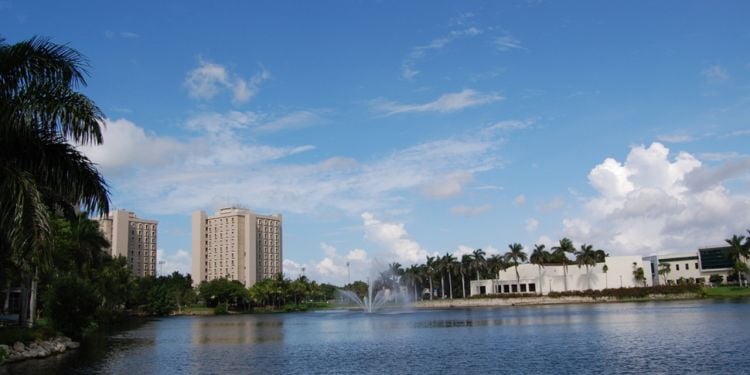
If you're planning to study in Miami, you won't be short of options. There are over 35 higher institutions in the Miami metropolitan area for you to choose from, as well as the area's amazing culture to explore. Being an international student in Miami is a blast, but you'll have to be disciplined and not get too distracted by Miami's fun party culture.
Why study in Miami?
Miami may not be the most obvious choice for a study destination. It may not be a finance and business center like New York, an academic or research hub like Boston, or the best place to get your startup going like Austin or SF. However, the benefits of studying in Miami include the following:
- Favorable employment landscape: Miami presents a compelling case for expats seeking education due to Florida's low unemployment rate of 3.1% (as of late 2025), offering a stable economic environment. The city is also home to an array of both national and international businesses, a strong GDP and lots of potential job prospects for students
- Recreation and coastal lifestyle in Miami: So long as you can be disciplined to hit your books when you need to, selecting Miami for your studies provides more than just academic benefits. Students can enjoy a huge array of recreational options, and the proximity to the ocean ensures an amazing Spring Break in Miami without the need for travel
- Career opportunities in tourism: Miami's status as a sought-after tourist destination extends advantages to students pursuing fields like tourism, hospitality, and hotel management. Those fluent in multiple languages have a distinct advantage in this field
- Multicultural enrichment in Miami: The allure of studying in Miami is not solely academic; it's also cultural. The city's historical ties to Spanish colonialism and Cuba infuse it with a rich diversity that is unlike any other US city.
The best universities in Miami
There are no Ivy League universities in the state of Florida, but you still have lots of quality educational establishments to choose from. Here's a breakdown of the top eight schools in Florida, including fees, student numbers, and acceptance rates. Comparisons of colleges and their various stats and rankings can be found online at Affordable Colleges and the Miami QS Rankings. In terms of fees, while researching colleges, you will likely see references to “in-state” and “out-of-state” tuition. Public universities in the US. charge lower rates to students who are official residents of that state (“in-state”) and higher rates to everyone else (“out-of-state”). International and expat students are always charged the out-of-state rate, since they don't meet state residency requirements.
University of Miami
The University of Miami, with around 19,500 students, is a top choice for expats who want a great education and a friendly campus. It offers various fields of study, such as marine science, health sciences, business, and music, with tuition at about $61,200 per year (this is for out-of-state fees). The acceptance rate at UoM is currently at around 19%.
Florida International University (FIU)
FIU, the only public research university in Miami, has a vast student body of around 55,000 and a lively campus life. Tuition is approximately $6,500 for in-state students and $18,600 for out-of-state students, making it one of the more affordable options for international learners. FIU accepts about 64% of applicants and is known for strong programs in hospitality, international business, engineering, and public health.
Nova Southeastern University (NSU)
NSU, home to about 20,900 students, is a private university that attracts many international learners thanks to the degrees it offers in health sciences. Key fields include health, law, business, and psychology. Tuition averages around $38,500 per year, and the acceptance rate is about 88%.
Barry University
With around 7,200 students, Barry University is a Catholic institution known for its close-knit campus and commitment to ethics and social justice. Tuition is roughly $33,600 per year, and the school accepts about 64% of applicants. Notable programs include nursing, social work, education, and fine arts.
Miami Dade College (MDC)
MDC is huge, with around 100,000 total learners (when you include non-degree learners), and is very community-oriented. Tuition is around $33,600 per year for international students. This school has close to a 100% acceptance rate, maintaining an open admissions policy.
St. Thomas University
St. Thomas University, with about 6,000 students, is a close-knit Catholic college that values morals and academics. Tuition is around $33,000, and they accept about 65% of applicants. They offer programs in law, business, and theology.
Everglades University
Everglades University has around 2,800 students and a reputation for teaching progressive subjects like sustainability and innovation. Tuition is about $22,000 annually, and they have a 71% acceptance rate. They are known for standout programs in alternative energy and environmental policy.
Florida Memorial University
With about 9,000 students, Florida Memorial University offers an intimate educational experience. Tuition is around $17,500, and they accept about 45% of applicants. The school's programs in business, aviation, education, and social sciences reflect its historic commitment to leadership and excellence within the African American community.
Applying for a student visa to study in Miami
To study in the United States, you must apply for a student visa. Those planning to study full-time will generally need to obtain an F-1 student visa. Note that once you have been granted your student visa, you must stay enrolled in the university and obtain good grades to maintain it.
- On an F-1 visa, you may work for up to 20 hours per week, but only in an on-campus job. Students may also apply for Curricular Practical Training (CPT) or Optional Practical Training (OPT) if eligible, allowing limited off-campus work related to their field of study. If you want to work off-campus, you will first need to file an application via the United States Citizenship and Immigration Services (USCIS).
- J-1 visas are meant for students doing an internship, working on research projects or being involved in similar activities in the US. Note that J-1 visas are only valid for the length of the program you are enrolled in.
- M-1 visas are intended for students enrolling in technical or specialized study programs that are not held at academic institutions. Generally, M-1 visa holders are not allowed to work while in the US.
To apply for a student visa in the United States, you must first be accepted into your chosen university, so this must be your first step. You will also need to show proof that your financial situation allows you to pay for tuition and support yourself throughout your stay in the US. As of 2025, students are advised to apply for their F-1 visa at least six months in advance due to longer processing times.
General requirements for entry to a university or college in Miami
Different colleges and universities in Miami may have different entry requirements for enrolling students. Make sure to check the admission rate at the university you are considering to evaluate your chances of being accepted.
The general requirements for applying to a university in Miami are as follows: You will need good grades from your previous study place, whether it is a diploma or an undergraduate degree. Note that your grades should be equivalent to the GPA (Grade Point Average) requirement at the university you are applying to.
If there is a big academic gap between your current educational establishment and the university you are applying to, and you can't enroll in a bachelor's degree program directly, consider taking a pathway program. Pathway programs are preparatory courses that are designed specifically for international students to help them catch up on the curriculum of American colleges and universities. Taking a preparatory course can help you significantly increase your chances of a successful application to a university in the US.
Another important requirement for applying to any university in the US is a good command of the English language. Most universities will ask for proof of your English language proficiency (in the form of a TOEFL or IELTS test) if you are not a native English speaker. As of 2025, some universities (including FIU and NSU) also accept Duolingo English Test scores as part of their admissions process.
Most universities can connect you with an international student advisor or an admissions counselor to guide you through the process and help you settle once you arrive.
Student life in Miami
Miami is an amazing city. Its rich cultural history, robust employment market, and vibrant nightlife make Miami an excellent student city. Here are some aspects of student life in Miami to be aware of.
A multicultural and bilingual city
Miami is a very culturally diverse place. Just being there means you will be encountering new cultures and ways of life. With strong South American and Cuban influences (in fact, around 72% of the city's population is of Hispanic or Latino origin), the city is also a great place to pick up some Spanish, the second most spoken language in the world.
If you want to study in North America but want to engage with a city that offers you a different cultural perspective than you might encounter in liberal coastal elite cities like New York, Boston, or San Francisco, Miami might be the right spot for you.
Work opportunities in Miami
Miami has a super low unemployment rate of just 3.1% (as of late 2025), which means that you may have a higher chance of landing an internship or a job offer here. Plus, the city is home to hundreds of national and international business firms and corporations that are always looking for new talent. Many universities in Miami are hubs of research and innovation. Students can engage in research projects, attend seminars, and contribute to cutting-edge advancements in various fields.
Arts, leisure and social life
There is lots to do and see in Miami. In fact, the one thing to watch out for when studying here is getting distracted by all the fun things the city has to offer. From cultural quarters like Little Havana and the Art Deco District to delightful street food, gorgeous beaches, and vibrant nightlife, Miami will give you lots of options for when it's not a school night. Visit the Wynwood Arts District for a taste of the city's creative output or spend some time in some of the many latin music joints in Little Havana.
Miami is also one of the most popular spots for Spring Break in the US. South Beach, in particular, is home to numerous parties, festivals, and music events attracting students from all over the US.
Transport
Miami's public transportation system and ride-sharing options make it easy for students to explore the city without needing a car. Unlike some cities, Miami offers an extensive public transit system known as “Miami-Dade Transit”. It includes buses, the Metrorail, and the Metromover. You can use an “Easycard” to navigate this system. These options allow students on a budget to travel within the city and connect to various neighborhoods, attractions, and universities for a low price – full-time college students in Miami-Dade County can actually ride the Metrobus and Metrorail for half the price of regular fares.
Get involved
Once you're beginning to settle in your first year, your overall experience will be shaped by what you are engaged in. Do your best to get involved in activities that you are passionate about.
Explore various organizations and clubs within and outside the school's premises, and then decide which group you are comfortable with. With more than 300 organizations and clubs on almost every campus, there are lots of activities to get excited about in Miami. Most universities will have a special page dedicated to clubs, activities, and organizations on campus, for instance, check out the list of student activities and organizations at the University of Miami.
Make friends, ask questions, and find a group of students with similar interests — this will only make your study experience in Miami more fulfilling.
Alumni network
One of the best things about studying in an international city like Miami is the people you are going to meet and the friends you are going to make. As you study side by side for four years, you are sure to make some very interesting connections — and as you head to different destinations after graduation, there is a strong chance that you will stay in touch. The alumni network in Miami is one of the major benefits of studying in the US. And, whether you choose to stay in Miami or explore opportunities elsewhere, you will have a tight-knit community of former classmates supporting you.
Useful links:
We do our best to provide accurate and up to date information. However, if you have noticed any inaccuracies in this article, please let us know in the comments section below.








